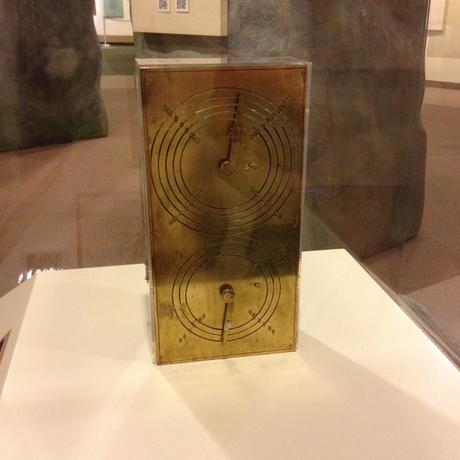A recent (in my personal interaction with time) article from the New York Times recounts two bad inventions by Thomas Midgley Jr. Namely, leaded gasoline and the practical use for chlorofluorocarbons. Besides making me interested in Midgley, the article got me thinking about inventors and inventions. We never know, in real time, if innovations are good ideas or not. We have no crystal ball and what seems like a good idea now may prove to be a catastrophe. I’ve given a couple of talks on the Antikythera mechanism. If you’re not familiar, it is essentially an analog computer invented in the first century. Experts suggest there were likely multiple such devices, but they never caught on and transformed society. Why? Nobody saw the practical benefits.
 A replica of the Antikythera mechanism
A replica of the Antikythera mechanism
The Antikythera mechanism was made essentially to predict eclipses and track the movement of heavenly bodies. The fact that such a thing existed within a century of when Jesus of Nazareth lived and died is mind-blowing at first. Still, it makes a point. We never know when an invention will take off and change the world. And we never know if that change will ultimately be good or bad. There are many who suggest that the invention of agriculture was a mistake. We eat less healthily than our hunter-gatherer ancestors, and they may have been much happier (in general) than we are. Still, agriculture (despite creating desk jobs) has its benefits. We live longer. We have medical science. And we can entertain ourselves with clever people on YouTube. While we sit around too much and eat things that really don’t benefit us, we seem to be doing okay. We’re living longer, at any rate.
The problem, it seems to me, is when capitalism takes an idea and blows it up into a huge money-making venture. People just can’t take their eyes off that shiny, shiny gold. And ideas, when they start making unreasonable demands (a new cellphone every other year? Really, is that necessary?) tend to lead to the same results as leaded gasoline and chlorofluorocarbons. If they can be monetized, ideas will push themselves into this unbroken feedback loop we call economy. Often at the price of ecology. Inventors are both necessary and dangerous. Their efforts often make the world more comfortable, more convenient. They might, however, cause immense harm. Being a vegan, I’d have a difficult time surviving as a hunter-gatherer. Gathering is more my style, in any case. If only I had a way of tracking the movement of heavenly bodies, I might just be content.
